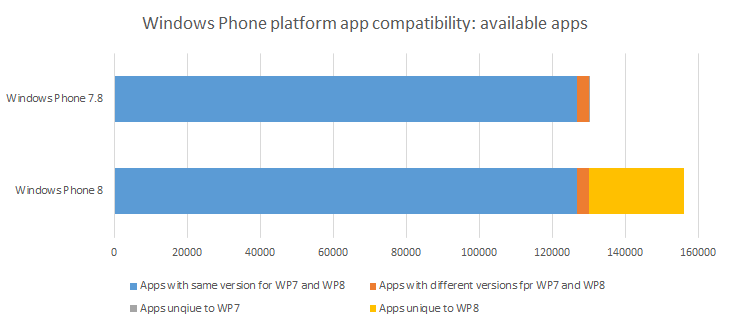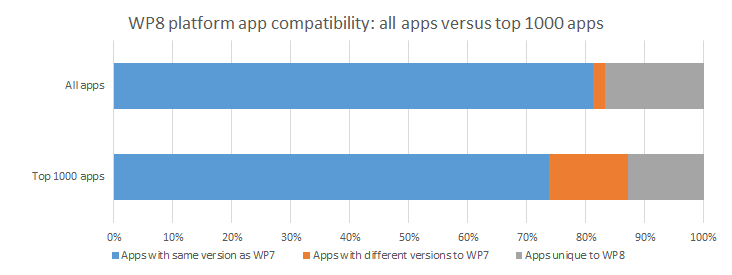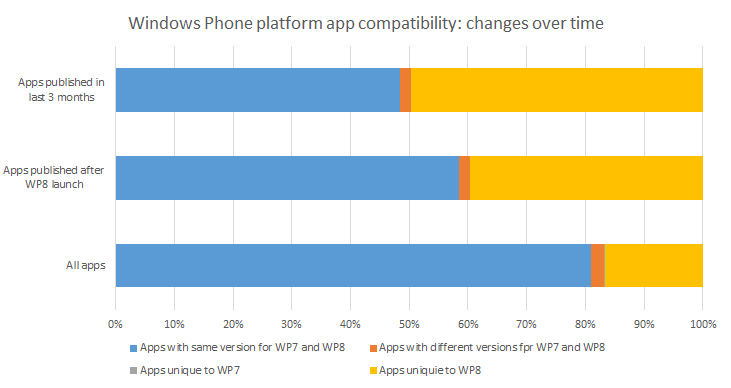Key findings
- More than 25,000 additional apps available for Windows Phone 8 compared to Windows Phone 7.8
- 83.5% of the apps available for Windows Phone 8 are also available for Windows Phone 7.8 (some may be different versions)
- Just over 25% of the top 1,000 apps on Windows Phone 8 are either unavailable, or offered as lesser versions, on Windows Phone 7.8 devices
- 50% of apps submitted in the last 3 months run only on Windows Phone 8
In detail
App incompatibility between the two versions of the Windows Phone generally happens for one of two reasons. Firstly, an app may use Windows Phone 8-specific APIs (e.g. lockscreen integration) or functionality (e.g. native code), and, secondly, a developer may opt to target/build their app only for Windows Phone 8, even if only the older APIs are used.
In both cases, it is sometimes possible for the developer to build a Windows Phone 7.x specific version (or leave in place an older version), but it may not have the same functionality as the Windows Phone 8 app, and may have a different version number. The two different versions of the app almost always share a common Windows Phone Store entry (developers can associate more than one .xap file with a given app GUID), with the correct version automatically served, depending on the device being used to browse the Windows Phone Store.
This issue of platform app compatibility is important because it has a direct impact on the number of apps available for older Windows Phone devices (e.g. Lumia 800, Samsung Focus, HTC TITAN). Older Windows Phone devices are still being used in significant numbers (around 35% of the installed base), and are still be sold in some markets (e.g. Nokia Lumia 505).
As a result, the first question we looked at is app availability for Windows Phone 7.8 and Window Phone 8, based on data mined from our app database (drawn from a crawl of the Windows Phone Store). All the numbers in this story are based on the unique ID for apps that are currently live in the Windows Phone Store (i.e. we have excluded hidden, unpublished, and other non-live apps). This means the numbers in the article are slightly below Microsoft's official app count.
There are currently 130,362 apps available for Windows Phone 7.8 devices. 126,719 are shared with Windows Phone 8 (same version), 3,305 are a different (lesser) version, and 338 are unique to Windows Phone 7.8 (though many of these have a separate Windows Phone 8 version, but under a different app ID).
By contrast, there are 156,071 apps available for Windows Phone 8, the same 3,305 apps are a different (greater) version), and 26,047 apps are unique to Windows Phone 8. This means there are 25,709 more apps available for Windows Phone 8 devices. Or, put another way, this means that 83.5% of the apps available for Windows Phone 8 are also available for Windows Phone 7.8, answering the question in the title of this feature.

While the above statistics tell us that more apps are available for Windows Phone (as you would expect), we wanted to see the impact platform compatibility has on the availability of the apps that matter most. To try and get a handle on this, we looked at the breakdown (common, different versions, unique) for "all apps" versus the breakdown for the "top 1,000 Windows Phone apps" (ranked by popularity).
The chart below shows that, for the most popular apps, a smaller proportion are Windows Phone 8 only, when compared to the total app pool. However, a higher proportion of apps have different versions available for the respective platforms. This likely reflects the greater likelihood of a popular app being "upgraded" to Windows Phone 8 (e.g. adding lockscreen integration), but with an older Windows Phone 7.x version left in place (or, in some cases, developed in parallel).
For consumers, this means that just over 25% of the top 1,000 apps are either unavailable, or offered as a lesser version, on Windows Phone 7.8 devices. That's certainly enough for there to be some app envy for users of Windows Phone 7.8 devices.

We also wanted to look at how this situation might change over time. Both statistics above are moderated by the fact that Windows Phone 8 is still quite young as a platform. It is only since last October than platform app compatibility has become an issue in the Windows Phone world (app compatibility based on RAM limits being the main concern prior to that time), as all previously available apps, as noted above, work on Windows Phone 8. Therefore it's helpful to look at just the apps published since November 1st 2012.
Approximately 40% of the apps published since the launch of Windows Phone 8 are unique to Windows Phone 8 (i.e. not available to Windows Phone 7). If you look at just the last 3 months, that proportion rises to almost 50%.

These last sets of figures look quite alarming for Windows Phone 7.8 users, especially those looking to get a regular app fix by downloading fresh content. It also means that, from an app point of view, the older Windows Phone devices are significantly less capable than Windows Phone 8-based devices.
However, seeing this as purely bad news would be a mistake. The apps that are unique to Windows Phone 8 are often that way for a good reason, using APIs and features that are not available on the earlier version of the platform. A good example of this are games that are built on a native code gaming engine (e.g. Unity).
This is an issue that impacts all smartphone platforms. In the fast moving world of smartphones, the latest version of any platform is always going to attract the most attention from developers, especially if it enables them to stand out from their competitors. Thus running an earlier version of any platform will always result in something of an app gap. In the case of Windows Phone, the lack of an upgrade to Windows Phone 8 for older, Windows Phone 7.x based devices has perhaps made the impact more severe than might otherwise have been the case.
See also
This is an example of the type of reports that can be created by the AAWP App Tracking service. We also use the service to generate our regular reports on Windows Phone milestones and answer questions around 512MB device app compatibility. If you're interested in getting additional insight or more detailed data, please get in touch and ask about the AAWP App Tracking service.
